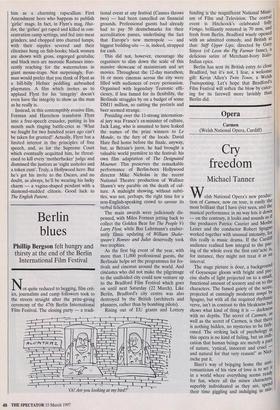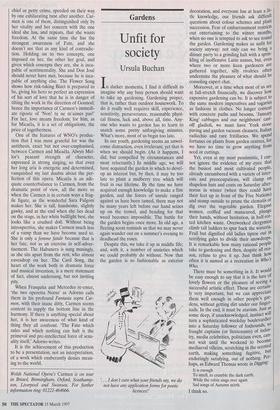Opera Carmen (Welsh National Opera, Cardiff)
Cry freedom
Michael Tanner
Welsh National Opera's new produc- tion of Carmen, now on tour, is easily the most brilliant that I have ever seen, and the musical performance in no way lets it down — on the contrary, it looks and sounds as if the producers Patrice Caurier and Moshe Leiser and the conductor Robert Spagno worked together with unusual intensity, for this really is music drama. If the Cardiff audience realised how integral to the pac- ing of the whole even the first entr'acte is, for instance, they might not treat it as an interval. The stage picture is dour, a background of Goyaesque gloom with bright and pre- cise shafts of light projected on to a small, functional amount of scenery and on to the characters. The famed gaiety of the score, projected at cunningly moderate tempi by Spagno, but with all the required rhythmic verve, isn't in contrast to this bleakness but shows what kind of thing it is — darkness with no depths. The secret of Carmen, as well as the secret of Carmen, is that there is nothing hidden, no mysteries to be fath- omed. The striking lack of psychology M this opera is no kind of failing, but an inch- cation that human beings are merely a part of nature, 'cynical, innocent and cruel and natural for that very reason!' as Niet- zsche put it. Bizet's way of bringing home the ant!' romanticism of his view of love is to set It in a world where everything seems ready for fun, where all the minor characters; superbly individuated as they are, spend their time giggling and indulging in ills- chief or petty crime, speeded on their way by one exhilarating tune after another. Car- men is one of them, distinguished only by her vitality and her concern with the one ideal she has, and repeats, that she wants freedom. At the same time she has the strongest awareness of Fate, and she doesn't see that as any kind of contradic- tion. Holding on to two concepts, one imposed on her, the other her goal, and given which concepts they are, she is inca- pable of sentimentality. She and Don Jose should never have met, because he is inca- pable of anything else. The Flower Song shows how risk-taking Bizet is prepared to be, giving his hero so perfect an expression of his sort of love that he is in danger of tilting the work in the direction of Gounod; hence the importance of Carmen's immedi- ate riposte of 'Non! to ne m'aimes pas!' For her, love means freedom; for him, as for Micaela, it is a set of obligations, the price of togetherness.
One of the features of WNO's produc- tion that I was most grateful for was the antithesis, exact but not over-emphasised, between Carmen and Micaela. Alwyn Mel- lor's peasant strength of character, expressed in strong singing, so that even her long aria is energetic and determined, vanquished my last doubts about the per- fection of this opera. Micaela is an ade- quate counterbalance to Carmen, from the dramatic point of view, all the more so when the Carmen is in certain ways a frag- ile figure, as the wonderful Sara Fulgoni makes her. She is tall, handsome, slightly gawky, and at the end when she lies dead on the stage, in her white bullfight best, she looks like a crushed doll. Without being introspective, she makes Carmen much less of a vamp than we have become used to. She is only a femme fatale because that is her fate, not as an exercise in self-adver- tisement. The Habanera is sung musingly, as she sits apart from the rest, who almost eavesdrop on her. The Card Song, the heart of the work both in dramatic force and musical invention, is a mere statement of fact, almost undersung, but not inviting pity.
When Frasquita and Mercedes re-enter, `the two operetta Norns' as Adorno calls them in his profound Fantasia copra Car- men, with their inane ditty, Carmen seems content to supply the bottom line in the harmony. If there is anything special about her, it is her awareness of what kind of thing they all confront. 'The Fate which rules and which nothing can halt is the primeval and pre-intellectual force of sexu- ality itself,' Adorno writes.
It is the achievement of this production to be a presentation, not an interpretation, of a work which exuberantly denies mean- ing to the world.
Welsh National Opera's Carmen is on tour in Bristol, Birmingham, Oxford, Southamp- ton, Liverpool and Swansea. For further information ring: 01222-464666.



































































 Previous page
Previous page